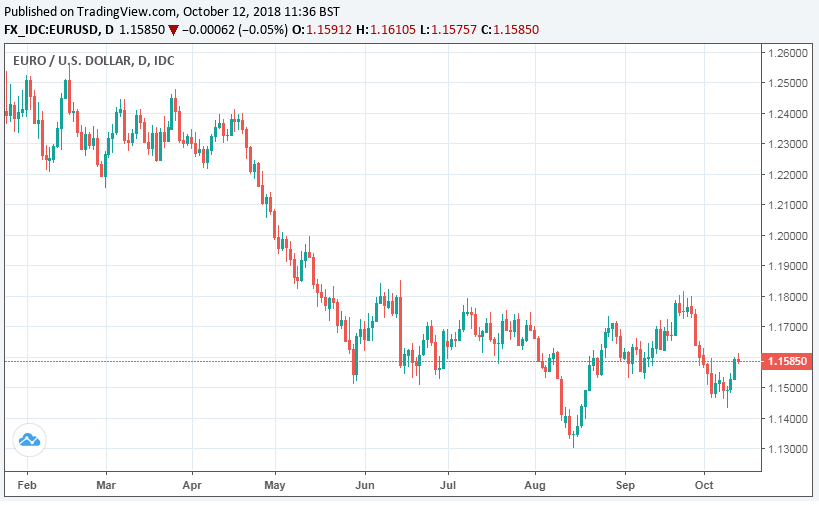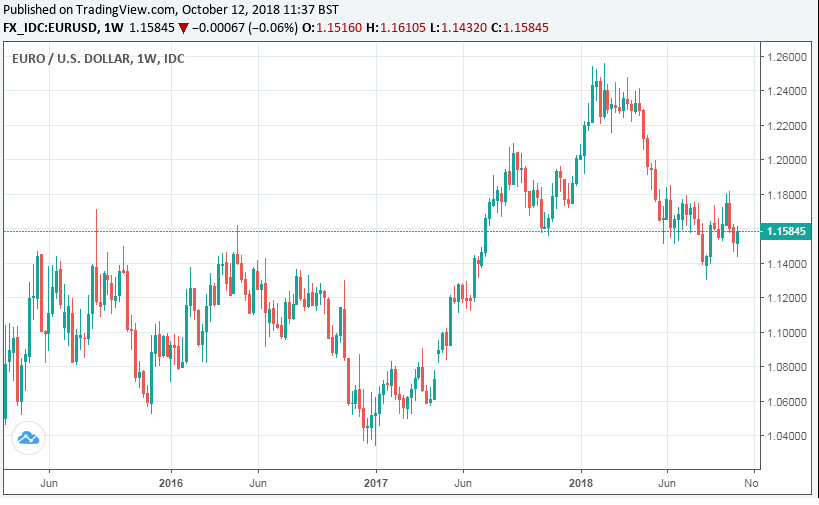Euro-to-Dollar Rate: German and Italian Politics to Dominate Agenda on Monday
- Written by: James Skinner

© Grecaud Paul, Adobe Stock
- Italy faces showdown with E.U. over budget plans next week.
- Ally of Germany's Merkel tipped for defeat in Bavarian election.
- Developments come as EURUSD tests key technical resistance level.
The Euro will face a double-barrelled political headwind on Monday just as the EUR/USD rate knocks on the door of a key technical resistance level.
Germans will go back to the polls on Sunday to determine which political party will lead the legislature of Bavaria, the most populous state in Europe's largest economy, which has become a key battleground for establishment and anti-establishment forces in Germany.
Hessen will hold its own vote on October 28.
The Bavarian result will become known at the same time as the deadline for Italy's government to submit its 2019 budget plan to the EU Commission for approval passes.
Preliminary details and speculation about the coalition government's actual spending plans have already rocked the Euro in recent weeks.
Markets will receive clarity around the volatile political situation in the Germany and Italy's rebellious fiscal plans at the same time as the Euro-to-Dollar rate trades close to a key technical level.
"Lack of catalysts today means that EUR/USD could fall shy of moving above the 1.1630 level (100-day-moving-average). Expect the Italian budget noise to be a limiting factor," says Viraj Patel, an FX strategist at ING Group.
The 1.1630 level represents a key psychological threshold for the market, from which the Euro has already been rejected once, so the single currency is likely to need a burst of fresh momentum in order to overcome it.
"EUR/USD continues to recover from just ahead of 1.1411, the 78.6% retracement. Note that the Elliot wave count is suggesting that the rally will fail circa 1.1625 – we will tighten up stops on our positions just in case," says Karen Jones, head of technical analysis at Commerzbank.

Above: Euro-to-Dollar rate shown at daily intervals.
Fresh momentum for another northward march might come on Monday if Italy's spending plans turn out to be less of a red rag to the raging bull that is Brussels' and its budget policies than markets have previously feared, and if events in the German political arena fail to provide fresh ammunition to Chancellor Angela Merkel's opponents and the nation's critics of the EU.
However, the reverse of that scenario is also a distinct possibility.
If Italy's budget plans are sufficient to prompt further market concern about a possible confrontation with Brussels, or if Germany's latest regional election returns a result that incites fear for the stability of the coalition government, then Europe's single currency may easily find itself under renewed pressure.
"While the outcomes will likely not directly affect the Grand Coalition, they will be indicative of changing voter preferences, since roughly 25% of Germans live in these states," Tomasz Wieladek, an international economist at Barclays. "While underperformance in regional elections following federal election is not uncommon, the current polls predict unusually large underperformance, especially in Bavaria."
Nationwide support for Germany's governing parties plunged to a fresh low at the beginning of October, according to the DeutschlandTrend survey by Infratest Dimap, which was commissioned by the broadcaster ARD Television.
Chancellor Angela Merkel's Christian Democratic Union and its sister party, the Christian Social Union, lost another three percentage points of support in September and now have the backing of just 26% of the electorate.
Germany's SPD, which forms the other half of the so called Grand Coalition, also lost three points to be left with support from just 15% of voters.
The implication of this is that if a general election were held now, the Grand Coalition would be not secure the support required in order for it to govern with a majority.
In other words, Germany's established parties would either be relegated to a minority government position or face having to cobble together an even larger and more fractious coalition.

Above: Euro-to-Dollar rate shown at weekly intervals.
Advertisement
Get up to 5% more foreign exchange by using a specialist provider to get closer to the real market rate and avoid the gaping spreads charged by your bank when providing currency. Learn more here
Sunday to Bring Fresh Headache for Chancellor Merkel?
Sunday's election will pit Chancellor Angela Merkel's coalition partner, the Christian Social Union (CSU), against a series of non-coalition rivals.
Opinion polls give varying levels of support for the CSU but almost all show it lacking the 40% required for it to lead the Bavarian regional assembly. The CSU has won in Bavaria for much of the post-war period.
ING Group economists have previously flagged the 18% slice of the electorate that is likely to back the Greens as a significant threat to the incumbents.
But the Alternative for Deutschland (AFD), which opposes Chancellor Merkel's migration policies and has called for Germany to leave the EU, has 10% support while another Eurosceptic party, the Free Voters, also has around 10% if pollsters are still to be believed.
However, economists at Germany's Berenberg Bank are unperturbed by the poll numbers and are saying the vote should have little direct impact on German or European government policy regardless of the outcome.
"Likely heavy losses for Angela Merkel‘s CDU/CSU at state elections in Bavaria (14 October) and Hesse (28 October) may fan the talk that she may not serve out her full term as Chancellor until 2021. However, her position is probably still secure for now," says Dr Holger Schmeiding, chief economist at Berenberg. "European policies should not be affected even if the right-wing AfD makes further noteworthy gains."
Advertisement
Get up to 5% more foreign exchange by using a specialist provider to get closer to the real market rate and avoid the gaping spreads charged by your bank when providing currency. Learn more here
Italy-EU Day of Reckoning Arrives
Markets will given a dose of the current German political move just as the "populist" Italian government finally delivers its budget plan to the desks of EU officials for approval on Monday.
Italy is widely reported to be planning a 2019 fiscal programme that would see it run a budget deficit equal to 2.4% of GDP, assuming the administration's economic growth forecasts do prove too optimistic. Some say they might and if they are, the likely deficit would be even higher.
This is a problem for Italy and Brussels because the former is in breach of the rules set out in the Maastricht Treaty, which forbid budget deficits in excess of 3% of GDP and national debt of more than 60% of GDP.
Italy had a budget deficit equal to 2.3% of GDP in 2017 and national debt in excess of 130% of GDP. Italy's medium term targets under the preventative arm of the Stability and Growth Pact require an annual reduction in the deficit that is equal to at least 0.5% of GDP.
"After pre-announcing a projected deficit of 2.4% all across the 2019-2021 period, the government was confronted with the market reaction and with warnings from senior officials from the EU Commission. It then decided to amend the proposal, trimming deficit projections for 2020 to 2.1% and for 2021 to 1.8%," says Paolo Pizzoli, an economist at ING Group. "The government sounds unwilling to resume convergence towards the MTO path before economic growth has consolidated."
The preventative arm of the Stability and Growth Pact gives the European Commission powers to initiate an Excessive Deficit Procedure when medium-term budgetary objectives are not achieved. That could result in, among other things, a already-fiscally-challenged Italy being fined by the EU.
But compliance from the government would be at odds with its anti-austerity and anti-establishment election mandate and could lead to even greater anti-Euro sentiment in Italy, potentially endangering the nation's place as a member of the single currency bloc.
Advertisement
Get up to 5% more foreign exchange by using a specialist provider to get closer to the real market rate and avoid the gaping spreads charged by your bank when providing currency. Learn more here




